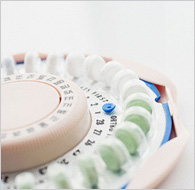
Like most OB/GYNs, I’ve prescribed my share of birth control pills, even though I’ve long argued that there are safer alternatives that are just as effective when used conscientiously. As long as you don’t mind putting your ovaries on “automatic pilot” and ignoring your fertility, there’s nothing that comes close to the pill for sheer convenience. That’s why oral contraceptives (OCs), which ushered in the sexual revolution in the 1960s, are now used by more than 100 million women worldwide, many of whom love them and do well on it. But like most magic bullets, the pill definitely has a downside. And a very significant downside is, ironically, the fact that the pill can significantly lower sex drive!
Birth Control Pills and Sex Drive: What Every Woman Should Know
Research published in the January 2006 issue of the Journal of Sexual Medicine found that birth control pills significantly decrease circulating levels of testosterone, a hormone that is strongly associated with optimal sexual functioning. The result is diminished sexual interest, sexual arousal, initiation of sexual activity, and also sexual enjoyment. Since I’ve seen this for years in many (but not all) patients on the pill, I was very happy to learn of this new research, which confirms that the pill’s effect on libido is “not all in a woman’s head!”
Birth control pills are comprised of potent synthetic estrogens (for example, ethinyl estradiol) and synthetic progestins (for example, norethindrone) that diminish the levels of follicle stimulating hormones (FSH) and luteinizing hormone (LH), two pituitary hormones. This results in the metabolic suppression of ovarian function, including both the suppression of ovulation and testosterone production!
In addition, OCs also cause a marked increase in the production of sex hormone binding globulin (SHBG) in the liver. (This is the main binding protein for sex steroids.) The higher the SHBG levels, the more hormones are “bound” and unavailable for biologic effects on tissues. In the recent study on the pill’s effect on testosterone, researchers found that SHBG levels were four times higher in pill users than in those who had never used the pill. This means that although a woman taking OCs produces testosterone in her body, it’s unavailable for normal uses such as stimulating her sex drive.
Even more worrisome is that SHBG levels remained elevated in women for at least six months after they stopped taking the pill, after which the study was concluded. No one knows how long this effect lasts, but researchers are concerned that prolonged exposure to synthetic hormones induces gene-imprinted and increased gene expression of SHBG in the liver in some women who have used the pill.
Dr. Claudia Panzer, an endocrinologist in Denver, Colorado and the lead author of the study, was quoted in a press release issued on January 3, 2006. She said, “It is important for physicians prescribing oral contraceptives to point out to their patients potential sexual side effects, such as decreased desire and arousal, decreased lubrication, and also increased sexual pain. Also if women present with these complaints, it is crucial to recognize the link between sexual dysfunction and the oral contraceptive, and not to attribute these complaints solely to psychological causes.” I certainly agree with Dr. Panzer!



Does HRT have the same impact on sex drive?
What are the safer alternatives to birth control pills that you mentioned above?
Thanks!
Angela